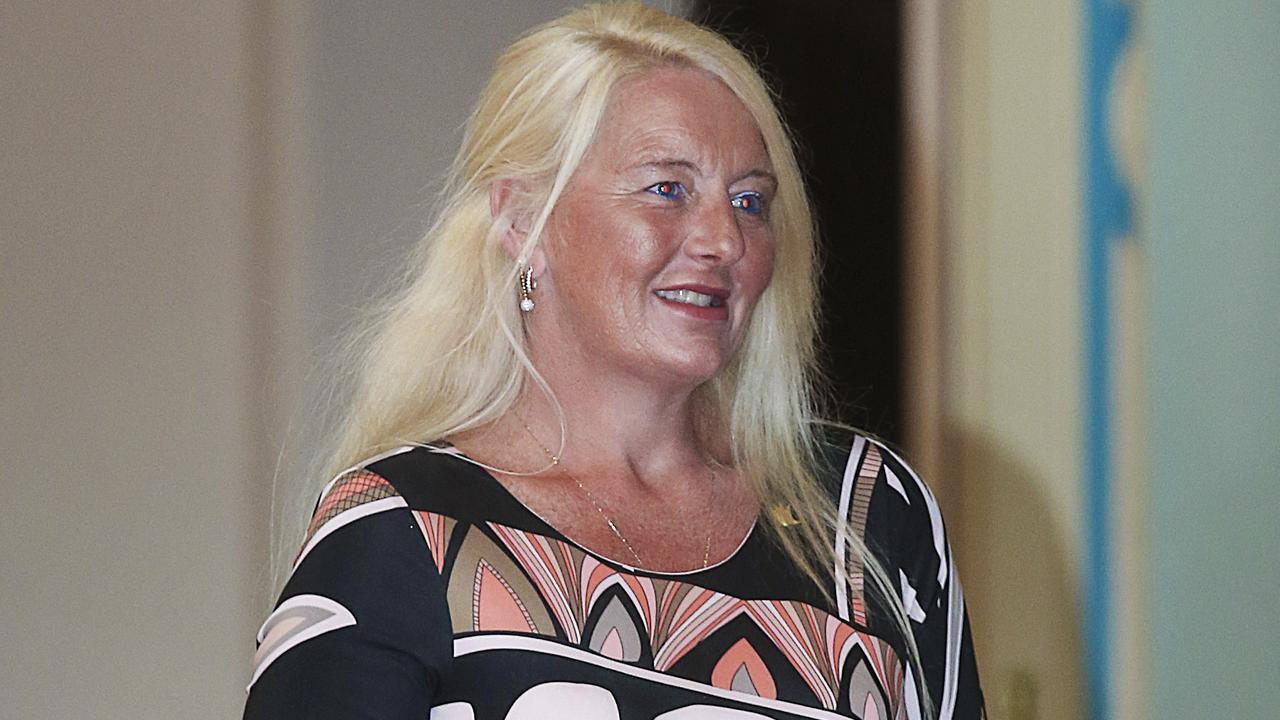Basket of deplorable political phrases don’t fit Canberra

In the year Donald Trump was born, George Orwell wrote about the “special connection between politics and the debasement of language”. He warned of the risk to our language and thought of mindlessly adopting and repeating the language of political hacks designed to conceal, rather than reveal, what is going on.
As president-elect Trump and his supporters promise to “drain the swamp”, Australia’s political language is under attack from a virulent strain of Twitter-borne contagion: the jargon that infected the US election and Brexit campaigns. Like George HW Bush’s reverse two-fingered victory salute during a visit, some of the newly adopted terms sit awkwardly in the local landscape. Others have origins far removed from contemporary meaning.
Drain the swamp
Who would have thought Ronald Reagan would adopt an anti-capitalism catchcry of America’s long defunct Social Democratic Party? The Gipper, like The Donald, came to Washington promising to drain the swamp. He’d pinched this line, perhaps unwittingly, from prominent figures in America’s early 20th-century socialist movement who saw market speculators flourishing like mosquitoes in the swamp of capitalism. It was evoked by others as a mantra for cleaning up the criminal justice system and protecting the nation’s bedrooms from venereal disease.
In Washington, DC, it is an apt metaphor, given the national capital was built on the marshy lowlands that surround the Potomac River and swelter every summer thanks to the Gulf Stream. This is why figures from both sides of politics, including Reagan, George W. Bush’s defence secretary Donald Rumsfeld and Democratic congresswoman Nancy Pelosi have appropriated the slogan.
Transplanting the phrase to Canberra, which sits 550m above sea level and is known for crisp winters and dry summers, seems as natural as Spanish moss on a gum tree. This hasn’t stopped Cory Bernardi and other patient gardeners from giving it a go. Of Trump’s three-word slogans, “drain the swamp” is the most enduring, with “build a wall” and “lock her up” already ditched by their sponsor.
Post-truth
Oxford Dictionaries announced post-truth as its international word of 2016. It is defined as an adjective “relating to or denoting circumstances in which objective facts are less influential in shaping public opinion than appeals to emotion and personal belief”. According to the publishers, the phrase was first used in 1992 by American playwright Steve Tesich to explain why Reagan’s unconvincing testimony in the Iran-Contra affair made no dent in his popularity. It is now being freely used as a shorthand, hyphenated rationalisation by people who can’t accept Britain could have dumped the EU or that the US could have plumped for Trump if they’d been bothered by facts. It is a term devoid of colour and rich in condescension.
Post-truth politics has already had a trial run in Australia, where Labor’s “Mediscare” campaign bit hard against a Coalition government that had no intention of substantially changing our public healthcare system. The Macquarie Dictionary plans to include the term in its next edition. Whether the rest of us adopt it is another matter. It has obvious appeal to political science academics and their erstwhile PhD candidates but you’d hope most Australians still know a porkie when they see one and are happy to call it out.
Silent majority
Given how noisy they are, this group is overdue for a new name. Richard Nixon, early in his presidency, appealed to the “great silent majority” of Americans to support his decision to keep fighting the Vietnam war. In a televised address, he distinguished this constituency from the anti-war protesters who had loudly taken to the streets across the country.
Today, the silent majority can be read and heard everywhere. They find voice each day in the online reader comments to any politically contentious story published by this newspaper. They are championed by influential columnists and radio broadcasters. Politicians jostle to represent them like shoppers at a Boxing Day sale. They remain silent only to the pollsters, who somehow failed to hear them in the lead-up to Brexit and the US election.
Basket of deplorables
This is the phrase that Hillary Clinton, in a moment of hubris, coined to describe the silent majority lurking beyond the view of pollsters and Democratic Party operatives in states such as Michigan, Wisconsin and Pennsylvania. It was one of the few genuinely original phrases uttered in the entire US election saga and, fatefully, it devoured the author.
According to Wordnik, a California-based online dictionary and etymological blog, deplorables was first used as a noun by Walter Scott, a Scottish writer who bequeathed a tangled web of quotable quotes. Writing in 1828, Scott posed a question that will haunt Clinton in her dotage: “What better is an old fellow, mauled with rheumatism and other deplorables?” Wordnik also cites an article printed in a 1901 edition of The Smart Set: A Magazine of Cleverness, a publication for high-society New York. The passage could have been written by a Clinton supporter stuck on a cross-city train with red-hatted Trump voters. “He turned to the east and took a Third Avenue car down town. It carried a load of deplorables; all uninteresting, some offensive.”
Clinton, or whichever hapless speechwriter came up with the line, is the first to put all her deplorables in the one basket, like a toxic Christmas hamper: “Racist, sexist, homophobic, xenophobic, Islamophobic — you name it.”
As a campaign strategy, deploring people who are tempted to vote for your opponent is unlikely to be repeated anytime soon, here or in the US. Deplorables has been jettisoned by the Democrats but survives as a self-deprecating T-shirt worn by people who still want to lock her up.
Virtue signalling
A boom phrase in the Brexit debate, virtue signalling has eclipsed latte sipping as the preferred slap-down by those who claim to represent the silent majority against those who bemoan the new, post-truth world. Various newspaper columnists have taken dibs on this one, most notably The Spectator’s James Bartholomew, who claims he invented it 18 months ago, and Libby Purves from The Times who, to Bartholomew’s chagrin, has been credited with first using it. According to the Word Spy website, the earliest recorded use dates back to an obscure blog in 2004.
The meaning of virtue signalling is as vague as its origins. In general terms, it is a derogatory descriptor for something written to reflect well on the author rather than actually do something good; in other words, pretty much everything posted by anyone on social media.
As Bartholomew explained last year in his column “The awful rise of virtue signalling”, it is often expressed as a negative statement. “I hate four-wheel-drives” signals a virtuous concern for the environment. In the US political context, “I hate Trump” signals a virtuous attitude towards women and jurists with Mexican-born parents and an equally virtuous scepticism towards anti-Semitic banking conspiracies.
Conservatives occasionally have drawn attention to virtue signalling amid their own ranks. Ann Coulter, an influential American polemicist, last year lamented how virtue signalling produced debates about nothing. As she argued: “Republicans all agree 100 per cent that we are pro-Israel, pro-life, pro-gun. So why spend so much time on these issues? It’s just pandering, so who are they pandering to?”
Bartholomew believes virtue signalling is fundamentally lazy. “One of the crucial aspects of virtue signalling is that it does not require actually doing anything virtuous. It does not involve delivering lunches to elderly neighbours or staying together with a spouse for the sake of the children. It takes no effort or sacrifice at all.”
A bigger problem with virtue signalling is the phrase has been cruelled by overuse. In his 1946 essay Politics and the English Language, Orwell offered a succinct guide to good writing that still rings true for any subeditor tasked with deflating bloated copy. “Never use a metaphor, simile, or other figure of speech which you are used to seeing in print,” Orwell cautioned. “Never use a foreign phrase, a scientific word, or a jargon word if you can think of an everyday English equivalent.” An addition to this might be: Never use a word or phrase if it is already a hashtag trending on Twitter.
Alt-right
This increasingly ubiquitous phrase should be handled with care. It is deliberately benign: a non-threatening euphemism intended to mask the racially charged views of an unruly collection of right-wing extremists. Oxford Dictionaries, which shortlisted alt-right alongside post-truth as its word of the year, defines it as: “An ideological grouping associated with extreme conservative or reactionary viewpoints, characterised by a rejection of mainstream politics and by the use of online media to disseminate deliberately controversial content.”
The person credited with inventing the term is Richard Spencer, head of the National Policy Institute, a white nationalist think tank. Spencer is young, highly educated, intelligent, articulate and a natty dresser. He also makes little effort to hide his admiration for the Nazis. At a gathering to celebrate the US election result, Spencer welcomed his triumphant followers with a straight-armed salute and urged them to “party like it’s 1933”, the year Adolf Hitler took over as Germany’s chancellor. Does he represent a vibrant new force in politics or is he merely an Illinois Nazi without the khaki shirts and silly hat? As Jake famously declared to Elwood in The Blues Brothers, “I hate Illinois Nazis.” There you go, virtue signalling again.
Inside the beltway
What did the number zero say to the number eight? “Hey, nice belt.” Now that I’ve got that joke into print, let’s banish “inside the beltway” from the Australian political lexicon. Just as Canberra isn’t built on a swamp, it doesn’t have a beltway or ring road, as they are known here. No, roundabouts don’t count.




To join the conversation, please log in. Don't have an account? Register
Join the conversation, you are commenting as Logout